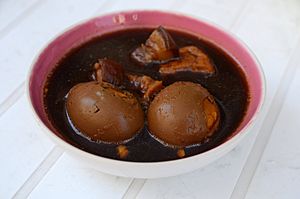Soy egg facts for kids
 |
|
| Place of origin | China |
|---|---|
| Main ingredients | Egg, soy sauce, sugar, water |
| Soy egg | |||||||||||||
|---|---|---|---|---|---|---|---|---|---|---|---|---|---|
| Chinese name | |||||||||||||
| Traditional Chinese | 滷蛋 | ||||||||||||
| Simplified Chinese | 卤蛋 | ||||||||||||
| Literal meaning | red cooking egg | ||||||||||||
|
|||||||||||||
| Vietnamese name | |||||||||||||
| Vietnamese | trứng nước tương | ||||||||||||
| Chữ Nôm | 𠨡渃相 | ||||||||||||
| Korean name | |||||||||||||
| Hangul | 장조림 | ||||||||||||
| Hanja | 醬조림 | ||||||||||||
|
|||||||||||||
| Japanese name | |||||||||||||
| Kanji | 味付け玉子 | ||||||||||||
| Kana | あじつけ たまご | ||||||||||||
|
|||||||||||||
A soy egg is a special kind of egg dish. It is popular in Chinese, Japanese, and Mauritian cuisine. To make a soy egg, a boiled egg is peeled. Then, it is cooked in a mix of soy sauce, sugar, water, and sometimes other herbs and spices.
This cooking method is called "red cooking." It can also be used for other foods like meat, vegetables, and tofu. These dishes are often called lou mei. Soy eggs can be made from chicken, duck, or even quail eggs. They are similar to tea eggs. A very dark and chewy soy egg is known as an iron egg.
Contents
Soy Eggs in Chinese Cooking
In China, soy sauce eggs are called Lujidan or Ludan. They are a very popular street food. The special sauce they are cooked in is called lushui.
Soy eggs are often served with noodles. They are placed on top of a bowl of noodles in a tasty broth. You can also eat them by themselves as a quick snack. They go well with steamed rice too. Sometimes, they are added to congee, which is a type of rice porridge. Soy eggs are also a common side dish for Lor mee and Hainanese chicken rice.
Soy Eggs in Mauritian Cooking
In Mauritius, soy eggs are known as "dizef roti." This means "roasted egg." This dish shows the influence of Sino-Mauritians on the island's food. You can find "dizef roti" all year round in Mauritius.
People enjoy them as a topping for noodles. They are also put inside bao zi, which are steamed buns. Sometimes, they are cut into quarters and served as appetizers. These small pieces are very popular snacks during celebrations. When cooked, the egg yolk is usually fully firm.
Soy Eggs in Japanese Cooking
Japan has a similar way of making soy sauce eggs. They are called Ajitsuke Tamago, or sometimes just Ajitama. These eggs are often "half-cooked." This means the yolk is still a bit soft and runny. Ajitsuke Tamago are a traditional topping for ramen noodles.
See also
 In Spanish: Huevo a la soja para niños
In Spanish: Huevo a la soja para niños
 | Chris Smalls |
 | Fred Hampton |
 | Ralph Abernathy |

